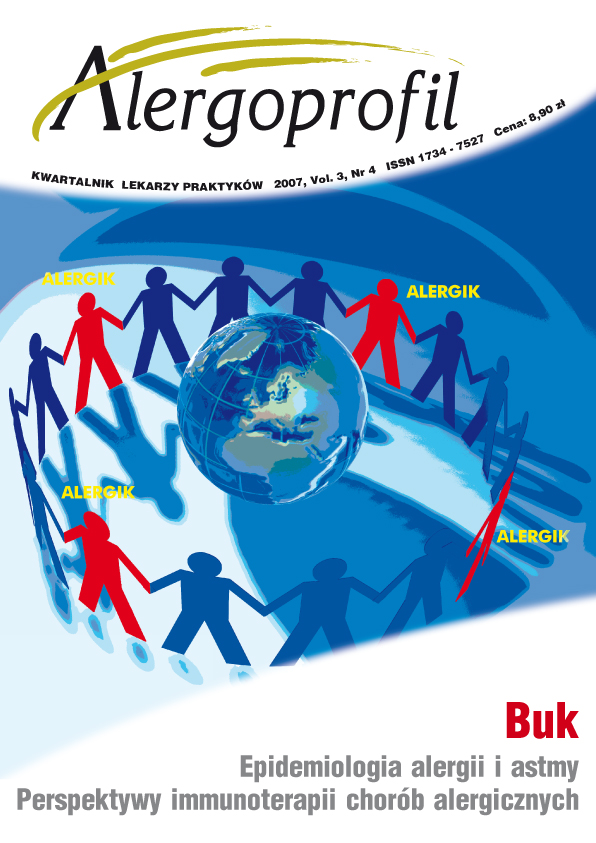Peptide immunotherapy for allergic and autoimmune diseases
Main Article Content
Abstract
Peptide-based immunotherapy has been developed in animal models and has been evaluated for human immunotherapy. Dominant T cell epitopes have been identified in both murine and human systems. Peptides based on these epitopes have been shown to prevent the induction of disease and to modulate ongoing disease in murine models of diseases following subcutaneous, oral, intranasal and intravenous administration. Peptide-induced tolerance has been demonstrated in models of experimental autoimmune encephalomyelitis (EAE), arthritis, diabetes (IDDM), myasthenia gravis, and more recently, in models of allergic sensitization with allergen sources including house dust mite, birch, bee venom and cat.
Downloads
Article Details
Copyright: © Medical Education sp. z o.o. This is an Open Access article distributed under the terms of the Attribution-NonCommercial 4.0 International (CC BY-NC 4.0). License (https://creativecommons.org/licenses/by-nc/4.0/), allowing third parties to copy and redistribute the material in any medium or format and to remix, transform, and build upon the material, provided the original work is properly cited and states its license.
Address reprint requests to: Medical Education, Marcin Kuźma (marcin.kuzma@mededu.pl)
References
2. Larche M., Wraith D.C.: Peptide-based therapeutic vaccines for allergic and autoimmune diseases. Nat Med 2005; 11 (4 supl.):S69-S76.
3. Gaur A., Wiers B., Liu A., Rothbard J., Fathman C.G.: Amelioration of autoimmune encephalomyelitis by myelin basic protein synthetic peptide-induced anergy. Science 1992; 258(5087):1491-4.
4. Metzler B., Wraith D.C.: Inhibition of experimental autoimmune encephalomyelitis by inhalation but not oral administration of the encephalitogenic peptide: influence of MHC binding affinity. Int Immunol 1993; 5(9):11 59-65.
5. Prakken B., Wauben M., van Kooten P., Anderton S., van Der Z.R., Kuis W. et al.: Nasal administration of arthritis-related T cell epitopes of heat shock protein 60 as a promising way for immunotherapy in chronic arthritis. Biotherapy 1998; 10(3):205-11.
6. Tian J., Atkinson M.A., Clare-Salzler M., Herschenfeld A., Forsthuber T., Lehmann P.V. et al.: Nasal administration of glutamate decarboxylase (GAD65) peptides induces Th2 responses and prevents murine insulin dependent diabetes. J Exp Med 1996; 183(4):1561-7.
7. Daniel D., Wegmann D.R.: Protection of nonobese diabetic mice from diabetes by intranasal or subcutaneous administration of insulin peptide B-(9-23). Proc Natl Acad Sci U S A 1996; 93(2):956-60.
8. Elias D., Meilin A., Ablamunits V., Birk O.S., Carmi P., Konen-Waisman S. et al.: Hsp60 peptide therapy of NOD mouse diabetes induces a Th2 cytokine burst and downregulates autoimmunity to various beta-cell antigens. Diabetes 1997; 46(5):758-64.
9. Warren K.G., Catz I., Ferenczi L.Z., Krantz M.J.: Intravenous synthetic peptide MBP8298 delayed disease progression in an HLA Class II-defined cohort of patients with progressive multiple sclerosis: results of a 24-month double-blind placebo-controlled clinical trial and 5 years of follow-up treatment. Eur J Neurol 2006; 13(8):887-95.
10. Bielekova B., Goodwin B., Richert N., Cortese I., Kondo T., Afshar G. et al.: Encephalitogenic potential of the myelin basic protein peptide (amino acids 83-99) in multiple sclerosis: results of a phase II clinical trial with an altered peptide ligand. Nat Med 2000; 6(10):11 67-75.
11. Raz I., Elias D., Avron A., Tamir M., Metzger M., Cohen I.R.: Beta-cell function in new-onset type 1 diabetes and immunomodulation with a heat-shock protein peptide (DiaPep277): a randomised, double-blind, phase II trial. Lancet 2001; 358(9295):1749-53.
12. Briner T.J., Kuo M.C., Keating K.M., Rogers B.L., Greenstein J.L.: Peripheral T-cell tolerance induced in naive and primed mice by subcutaneous injection of peptides from the major cat allergen Fel d I. Proc Natl Acad Sci U S A 1993; 90(16).
13. Maguire P., Nicodemus C., Robinson D., Aaronson D., Umetsu D.T.: The safety and efficacy of ALLERVAX CAT in cat allergic patients. Clin Immunol 1999; 93(3):222-31.
14. Marcotte G.V., Braun C.M., Norman P.S., Nicodemus C.F., Kagey-Sobotka A., Lichtenstein L.M. et al.: Effects of peptide therapy on ex vivo T-cell responses. J Allergy Clin Immunol 1998; 101(4 Pt 1):506-13.
15. Maguire P., Nicodemus C., Robinson D., Aaronson D., Umetsu D.T.: The safety and efficacy of ALLERVAX CAT in cat allergic patients. Clin Immunol 1999; 93(3):222-31.
16. Oldfield W.L., Kay A.B., Larche M.: Allergen-derived T cell peptide-induced late asthmatic reactions precede the induction of antigen-specific hyporesponsiveness in atopic allergic asthmatic subjects. J Immunol 2001; 167(3):1734-9.
17. Oldfield W.L., Larche M., Kay A.B.: Effect of T-cell peptides derived from Fel d 1 on allergic reactions and cytokine production in patients sensitive to cats: a randomised controlled trial. Lancet 2002; 360(9326):47-53.
18. Alexander C., Ying S., Kay B., Larche M.: Fel d 1-derived T cell peptide therapy induces recruitment of CD4CD25; CD4 interferon- gamma T helper type 1 cells to sites of allergeninduced late-phase skin reactions in cat allergic subjects. Clin Exp Allergy 2005; 35(1):52.
19. Fellrath J.M., Kettner A., Dufour N., Frigerio C., Schneeberger D., Leimgruber A. et al.: Allergen-specific T-cell tolerance induction with allergen-derived long synthetic peptides: results of a phase I trial. J Allergy Clin Immunol 2003; 11 (4):854-
20. Tarzi M., Klunker S., Texier C., Verhoef A., Stapel S.O., Akdis C. et al.: Induction of interleukin-10 and suppressor of cytokine signaling-3 gene expression following peptide immunotherapy. Clinicial Experimental Allergy 2006; 36(4):465-74.
21. Apostolou I., Von Boehmer H.: In vivo instruction of suppressor commitment in naive T cells. J Exp Med 2004; 199(10):1401-8.
22. Kretschmer K., Apostolou I., Hawiger D., Khazaie K., Nussenzweig M.C., von BH.: Inducing and expanding regulatory T cell populations by foreign antigen. Nat Immunol 2005; 6(12):1219-27.

